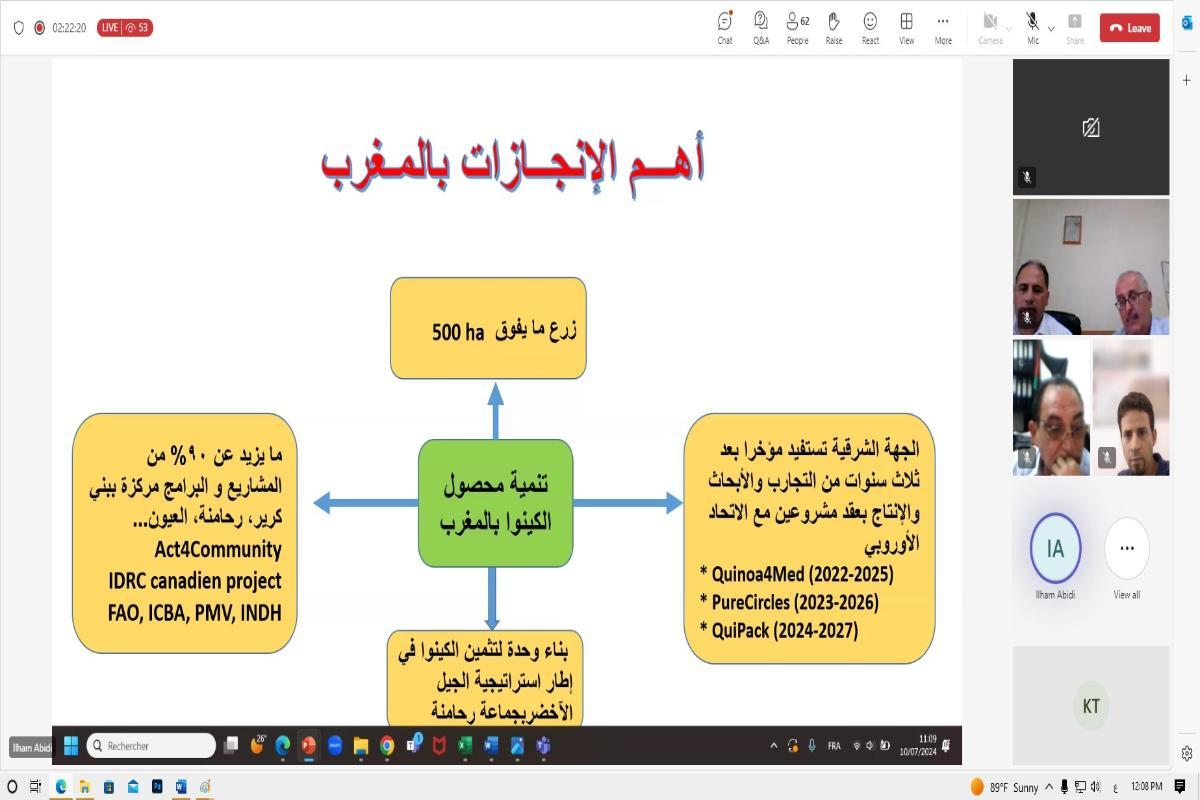
In recognition of World Quinoa Day, which occurs on July 7th every year, Al-Quds Open University organized a scientific symposium titled "Quinoa in the Arab World: A New Nutritional Journey". The symposium was organized in collaboration with the Arab Quinoa Forum and included participation from many Arab experts from Egypt, Tunisia, Algeria, Morocco, the UAE, and Iraq. The event aimed to bring together Arab experts to encourage networking among them, and to share their local experiences and expertise in quinoa cultivation.
This workshop is part of the activities of the "Quinoa Cultivation to Adapt to Climate Change in Palestine" project, funded by the Global Environment Facility /Small Grants Programme (GEF/SGP/UNDP), implemented by Al-Quds Open University in cooperation with the Ministry of Agriculture and the Palestinian Environment Quality Authority. The project aims to enhance the ability of Palestinian farmers to adapt to climate change by introducing crops that can withstand harsh climatic and environmental conditions, such as quinoa, with a focus on marginalized areas.
The Vice President for Academic Affairs, Prof. Husni Awad, emphasized that the purpose of this meeting was to transfer quinoa cultivation experiences in Arab countries, share success stories, and discuss the challenges faced by these countries and how they overcame them. Prof. Awad also highlighted the unique situation in Palestine, particularly the severe challenges imposed by the occupation, including the destruction and confiscation of agricultural lands and the control over water resources. He indicated that 80% of agricultural lands in the Gaza Strip have been damaged due to the aggression.
Ms. Nadia EL- Khodari, Natioanl Coordinator at GEF SGP Palestine, provided an overview of the program's role in encouraging and supporting local communities to solve their problems, and its efforts to protect biodiversity, regional waters, and reduce environmental pollutants.
Dr. Aziz Salama, the project coordinator at Al-Quds Open University, spoke about the importance of this meeting for direct communication with experts to advance the agricultural sector, and the need to benefit from the experiences of these countries when introducing quinoa cultivation to Palestine, especially in the Jordan Valley, which suffers from low rainfall and is a marginalized and threatened area in Palestine.
Dr. Loay Telkh, a researcher at the Palestinian National Agricultural Research Center, highlighted the importance of quinoa in reducing bread production costs by 20% if incorporated into bread making. He also noted its economic contribution to improving living standards, reducing poverty levels, and achieving food security.
The symposium concluded with several recommendations, including the need to continue holding such seminars to enhance cooperation among scientific research institutions in the field of quinoa cultivation and production research in Arab countries, promoting health awareness and linking quinoa production and consumption to public health, especially for autism and celiac disease patients; focusing on introducing mechanization techniques in production and post-harvest processes; emphasizing the importance of small farmers practicing traditional agriculture with a focus on maximizing the added value of the product; introducing new quinoa varieties compatible with climate change; strengthening communication with the "Arab Quinoa Forum" as a focal point for a larger gathering of relevant parties; and incorporating quinoa and its cultivation into related specializations at universities across Arab countries.
It is worth noting that the Continuing Education Center at Al-Quds Open University, represented by its director Dr. Mahmoud Hawamdeh and with the participation of Ms. Lina Ishtaiyeh and Ms. Randa Abdul Hay, supervised the arrangements for organizing and coordinating the symposium. Dr. Khaled Hardan, Dean of the Faculty of Agriculture at Al-Quds Open University, moderated the symposium, which drew more than 85 Arab participants.